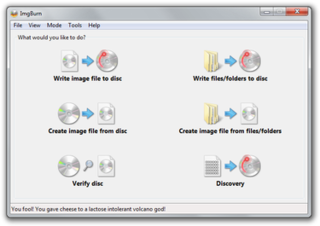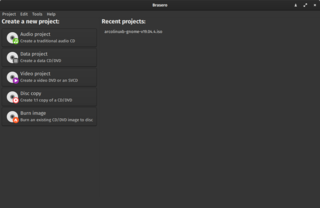This article needs additional citations for verification .(June 2011) |
A Freedom Toaster is a public kiosk that will burn copies of free software onto user-provided CDs and DVDs.
This article needs additional citations for verification .(June 2011) |
A Freedom Toaster is a public kiosk that will burn copies of free software onto user-provided CDs and DVDs.

The original Freedom Toaster project was sponsored by Mark Shuttleworth's Shuttleworth Foundation and built in Perl by Hamish Whittal. It consisted of a number of CD burning facilities (in kiosk form), where members of the public were able to burn copies of free and open-source software onto self-supplied blank CD media.
The project was started as one solution to overcome the difficulty of obtaining Linux and other free and open-source software in South Africa, where the restrictive telecommunications environment makes downloading large software files prohibitively expensive.
There are currently Freedom Toasters at the following locations: Bloemfontein, Cape Town (2), Diepkloof, Durban, East London, Grahamstown, Johannesburg (5), Knysna, Namibia, Pietermaritzburg, Port Elizabeth, Port Shepstone, Potchefstroom, Pretoria (3), Seneca College in Toronto, [1] Stellenbosch, Stockholm, Trivandrum. [2]
A Freedom Toaster kiosk is placed at a school, library, shopping center or another publicly accessible location. Users bring blank optical discs to the kiosk and select the software that they would like. The kiosk will then burn the selected software onto the users' media.
The name derives from this function. "Freedom" refers to the free and open source software provided. "Toaster" is a term for an optical disc burner.
Freedom Toaster kiosks provide a way for computer users in economically disadvantaged regions and areas with limited or no Internet access to get software. By providing this service, the people behind the Freedom Toaster hope to address the issue of the Digital Divide.
The Freedom Toaster is mostly available in South Africa and is currently supported by the Shuttleworth Foundation. The Foundation is attempting to get others to adopt the idea by providing the tools to help create, support and maintain your own Freedom Toaster. It has also provided seed funding to Brett Simpson of Breadbin Interactive to create a sustainable business model with the idea.
The initiative has also been taken up independently by a company in India - Zyxware Technologies [3] [4] - who has partnered with Free Software Users Group, Thiruvananthapuram to promote Freedom Toasters as a viable method to spread Free Software in India.

Free software, libre software, libreware or rarely known as freedom-respecting software is computer software distributed under terms that allow users to run the software for any purpose as well as to study, change, and distribute it and any adapted versions. Free software is a matter of liberty, not price; all users are legally free to do what they want with their copies of a free software regardless of how much is paid to obtain the program. Computer programs are deemed "free" if they give end-users ultimate control over the software and, subsequently, over their devices.
The free software movement is a social movement with the goal of obtaining and guaranteeing certain freedoms for software users, namely the freedoms to run, study, modify, and share copies of software. Software which meets these requirements, The Four Essential Freedoms of Free Software, is termed free software.

MiniDisc (MD) is an erasable magneto-optical disc-based data storage format offering a capacity of 60, 74, and later, 80 minutes of digitized audio.

A live CD is a complete bootable computer installation including operating system which runs directly from a CD-ROM or similar storage device into a computer's memory, rather than loading from a hard disk drive. A live CD allows users to run an operating system for any purpose without installing it or making any changes to the computer's configuration. Live CDs can run on a computer without secondary storage, such as a hard disk drive, or with a corrupted hard disk drive or file system, allowing data recovery.
Optical disc authoring, including CD, DVD, and Blu-ray Disc authoring, is the process of assembling source material—video, audio or other data—into the proper logical volume format to then be recorded ("burned") onto an optical disc. This act is sometimes done illegally, by pirating copyrighted material without permission from the original artists.

K3b is a CD, DVD and Blu-ray authoring application by KDE for Unix-like computer operating systems. It provides a graphical user interface to perform most CD/DVD burning tasks like creating an Audio CD from a set of audio files or copying a CD/DVD, as well as more advanced tasks such as burning eMoviX CD/DVDs. It can also perform direct disc-to-disc copies. The program has many default settings which can be customized by more experienced users. The actual disc recording in K3b is done by the command line utilities cdrecord or cdrkit, cdrdao, and growisofs. As of version 1.0, K3b features a built-in DVD ripper.

Mark Richard Shuttleworth is a South African and British entrepreneur who is the founder and CEO of Canonical, the company behind the development of the Linux-based Ubuntu operating system. In 2002, Shuttleworth became the first African to travel to space, doing so as a space tourist. He lives on the Isle of Man and holds dual citizenship from South Africa and the United Kingdom. According to the Sunday Times Rich List in 2020, Shuttleworth is worth an estimated £500 million.

Free and open-source software (FOSS) is software that is available under a license that grants the right to use, modify, and distribute the software, modified or not, to everyone free of charge. The public availability of the source code is, therefore, a necessary but not sufficient condition. FOSS is an inclusive umbrella term for free software and open-source software. FOSS is in contrast to proprietary software, where the software is under restrictive copyright or licensing and the source code is hidden from the users.
Free/open-source software – the source availability model used by free and open-source software (FOSS) – and closed source are two approaches to the distribution of software.
The Shuttleworth Foundation was established in January 2001 by South African entrepreneur Mark Shuttleworth as an experiment with the purpose of providing funding for people engaged in social change. While there have been various iterations of the foundation, its structure and how it invests in social innovation, the current model employs a fellowship model where fellows are given funding commensurate with their experience to match a year's salary, allowing them to spend that year developing a particular idea. The Foundation announced that it is shutting itself down "by the beginning of 2024."

ImgBurn is an optical disc authoring program that allows the recording of many types of CD, DVD and Blu-ray images to recordable media. Starting with version 2.0.0.0, ImgBurn can also burn files and data directly to CD or DVD. It is written in C++. It supports padding DVD-Video files so the layer break occurs on a proper cell boundary.

K9Copy is a free and open-source DVD backup and DVD authoring program for Unix-like operating systems such as Linux and BSD. It is licensed under the GNU General Public License.
dvd+rw-tools is a collection of open-source DVD and Blu-ray Disc tools for Linux, OpenBSD, NetBSD, FreeBSD, Solaris, HP-UX, IRIX, Windows and OS X. dvd+rw-tools does not operate CD media.

CDRWIN was a CD/DVD burning software for Microsoft Windows developed by Golden Hawk Technology company.
It progressed from lone wolf Jeff Arnold's hobby to a full-blown recording software that equals the power, performance, and features of many of the programs from the big boys.

Brasero is a free and open-source disc-burning program for Unix-like operating systems, it serves as a graphical front-end to cdrtools, cdrskin, growisofs, and (optionally) libburn. It is licensed under the terms of the GNU General Public License.
The following outline is provided as an overview of and topical guide to free software and the free software movement:
Notable software applications that can access or manipulate disk image files are as follows, comparing their disk image handling features.

AcetoneISO is a free and open-source virtual drive software to mount and manage image files. Its goals are to be simple, intuitive and stable. Written in Qt, this software is meant for all those people looking for a "Daemon Tools for Linux". However, AcetoneISO does not emulate any copy protection while mounting.
Nero Burning ROM, commonly called Nero, is an optical disc authoring program from Nero AG. The software is part of the Nero Multimedia Suite but is also available as a stand-alone product. It is used for burning and copying optical media such as CDs, DVDs, and Blu-ray disks. The program also supports the label printing technologies LightScribe and LabelFlash, and can be used to convert audio files into other audio formats.
The origins of the Free software community in Thiruvananthapuram can be traced back to the group of TeX users around the University of Kerala in early 1980s. The community then later named themselves Thiruvananthapuram LUG, GNU/Linux Users Group, Thiruvananthapuram and then ultimately Free Software Users Group, Thiruvananthapuram. The community has worked with the government in helping with key Free software initiatives in the government and also in promoting and supporting Free software among the general public. The community has also been instrumental in creating an IT policy favorable to Free software in the state of Kerala.